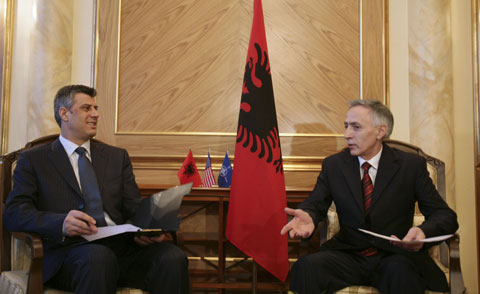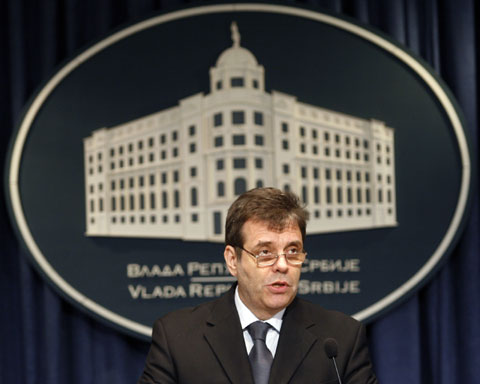Kosovo's parliament unanimously approved the province's historic declaration of independence from Serbia on Sunday, a move that is backed by the US and some European allies but bitterly contested by Serbia and Russia.
"Kosovo is a republic -- an independent, democratic and sovereign state," parliament speaker Jakup Krasniqi said as the chamber burst into applause.
Kosovo's Prime Minister Hashim Thaci (L) and Speaker of Parliament Jakup Krasniqi meet in Pristina February 17, 2008. Thaci summoned parliament on Sunday to a special session that voted and declared the province's independence from Serbia. [Agencies]
Serbia responded immediately by calling its mainly Albanian breakaway province a false state and condemning the United States for supporting it.
The lawmakers voted 109-0 to adopt the declaration. Eleven ethnic minority deputies, including Serbs, were absent.
"Deputies on February 17 expressed their will to declare Kosovo an independent, sovereign and democratic state," he said.
Across the capital, Pristina, a snow-covered city, revelers fired guns into the air, waved red and black Albanian flags and honked car horns in jubilation at the birth of the world's newest country.
Earlier, Prime Minister Hashim Thaci called on the parliament of Kosovo on Sunday to adopt a declaration of independence from Serbia.
"We the leaders of our people, democratically elected, through this declaration proclaim Kosovo an independent and sovereign state," Thaci told the assembly.
"This declaration reflects the will of the people," he said.
On the eve of the declaration, the NATO-led peacekeeping Kosovo Force -- with 17,000 troops from 34 nations -- said it would intervene robustly to prevent any inter-ethnic violence.
Kosovo is a cultural heartland of Serbia. But most of Kosovo's 2 million people are ethnic Albanians, who have been impatient with delays of the proclamation of independence.
Kosovo has been under UN administration since mid-1999, after NATO launched airstrikes to drive out Serbian forces from the province.
In April 2007, UN special envoy Martti Ahtisaari recommended the proposed internationally supervised independence for Kosovo.
The Ahtisaari plan is supported by the United States and the European Union, but opposed by Serbia and Russia.
Russia, a permanent member of the UN Security Council, has warned that Kosovo independence would set a dangerous precedent for regions across the world where there are ethnic tensions.
Global reactions to Kosovo independence
Minutes after Kosovo declared independence, Serbian Prime Minister Vojislav Kostunica condemned Kosovo as a false state in a televised address to the nation on Sunday.
He said Kosovo was propped up unlawfully by the United States which was "ready to violate the international order for its own military interests".
Serbian Prime Minister Vojislav Kostunica addresses the nation from the government building in Belgrade February 17, 2008 as Kosovo declares independence. Kostunica condemned Kosovo as a false state. [Agencies]
"Today, this policy of force thinks that it has triumphed by establishing a false state," Kostunica said. The Serb people will never stop fighting for their freedom, he said. "As long as the Serb people exist, Kosovo will be Serbia."
Serbia will never recognise the independence of Kosovo, Serbian President Boris Tadic said in a statement.
"Serbia will never recognise the independence of Kosovo. Serbia has reacted and will react with all peaceful, diplomatic and legal means to annul this act committed by Kosovo's institutions," Tadic said in the statement.
"I appeal to all our citizens in Serbia and in Kosovo to be led by reason," he said. The state of Serbia will take responsible moves and will do everything in its power to annul this arbitrary and illegaly proclaimed independence of Kosovo, he said.
"Serbia will not resort to violence and that is the only approach which can enable us to continue our legitmate fight to preserve the integrity of our country," Tadic added.
Russia's Foreign Ministry denounced Kosovo's independence declaration and calls for an emergency session of the UN Security Council.
"We expect the UN mission and NATO-led forces in Kosovo to take immediate action to carry out their mandate ... including the annulling of the decisions of Pristina's self-governing organs and the taking of tough administrative measures against them," the foreign ministry said in a statement.
"The decisions by the Kosovo leadership create the risk of an escalation of tension and inter-ethnic violence in the province and of new conflict in the Balkans," it said.
"Russia just called for Security Council consultations," Russian Foreign Ministry spokeswoman Maria Zakharova said.
Other diplomats said the consultations -- a closed debate among the council's 15 members -- would be held at 1800 GMT on Sunday.
The United States on Sunday reaffirmed its strong backing for an independent Kosovo.
"On Kosovo, our position is that its status must be resolved in order for the Balkans to be stable," US President George W. Bush said.
Georgia will not recognize Kosovo's independence, a parliamentary leader said Sunday.
"The Georgian authorities will not recognize Kosovo's independence," Interfax news agency quoted Konstantin Gabashvili, chairman of the Georgian parliamentary committee for foreign affairs, as saying.
(China Daily via agencies February 18, 2008)



